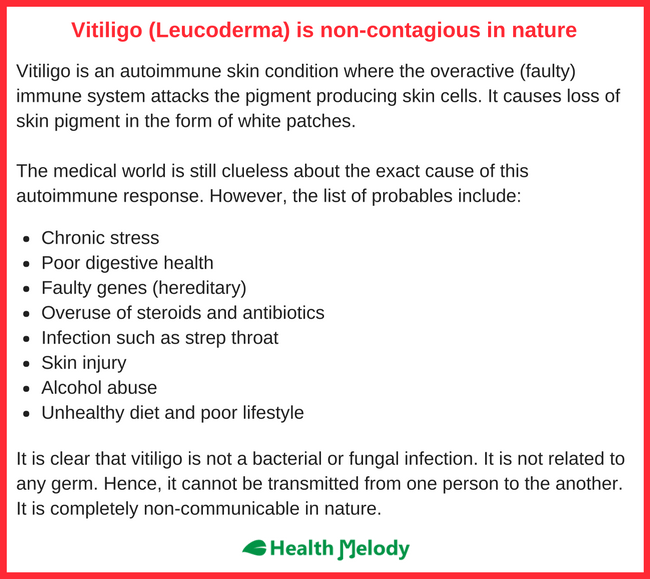
Is Vitiligo (Leucoderma) a contagious (communicable) Skin disease?
Vitiligo (leucoderma) is a non-contagious (non-communicable) skin condition and it cannot be transmitted by living together, sharing personal items, eating from the same plate or having physical relationship.
It is an autoimmune skin condition; the faulty immune system mistakenly attacks the healthy skin cells (melanocytes) that results in white patches on various areas of the skin. The melanocytes are skin cells that produce melanin (skin pigment) which gives color to your skin. Due to the autoimmune response, these melanocytes are attacked (or destroyed) to cause loss of skin pigment and discoloration of your skin. It means, vitiligo is not a bacterial or fungal infection, but an inner body issue. Thus, it doesn’t spread from one person to another.
Moreover, it is not medically dangerous- neither it is painful nor it is fatal in nature. In short, apart from affecting the physical appearance of your skin, vitiligo doesn’t have any serious consequences.
Research papers approve the non contagious nature of vitiligo
There are tons of research studies, reviews and case studies that acknowledge the fact the vitiligo is non-contagious in nature. Enlisted below a few of them:
| Research Paper Title | Journal Name | Reference link |
|---|---|---|
| Guideline for the diagnosis and management of vitiligo | British Journal of Dermatology, 2008, Vol 159 | Click here |
| Assessing the quality of life in children and adolescents with vitiligo | International Journal of Dermatology, Jan 2014, Vol 53 | Click here |
| Public perceptions and attitudes toward vitiligo | Journal of Cutaneous Medicine and Surgery, Sept-Oct 2012 | Click here |
| Measuring quality of life in indian vitiligo patients | Indian Journal of Dermatology, 2016, Vol 61 | Click here |
| The challenges facing with vitiligo: a phenomenological research | International Journal of Pharmaceutical Research & Allied Sciences, 2016, Vol 5 | Click here |
Vitiligo doesn’t spread from one person to another, says prominent doctors
Dr Leelavathy, a renowned dermatologist and head of the department of dermatology at the Bangalore’s Bowring Medical College and Research Institute, says that vitiligo is not contagious and doesn’t spread through touch or sharing things. Many youngsters with vitiligo tells that sometimes, people avoid shaking hands with them fearing that vitiligo can be transmitted through touch. The social stigma attached with vitiligo can be very traumatic and it affects not only the individual with vitiligo, but, the whole family. The state chapter of Indian Association of Dermatologists regularly organizes public awareness campaigns to educate people about non-contagious nature of vitiligo, she concludes.
Dr Anal Jyoti Bordoloi, a dermatologist at the Guwahati Medical College and Hospital, says that around 2 to 3% of the population in the Indian state of Assam are dealing with vitiligo. Every day we see nearly 50 to 60 patients of vitiligo in the OPD. Many of them complain about job rejections, discrimination from classmates and social isolation. Young boys and girls with vitiligo find it difficult to get married. Vitiligo is neither painful nor it spread from one person to another, but, people don’t know about these facts. We run a daylong vitiligo awareness campaign every year on the occasion of World Vitiligo Day (25th June) to remove misconceptions about vitiligo.
Vitiligo and marriage: Is it safe to marry someone with vitiligo?
In developing countries like India, vitiligo is a major obstacle in getting married. The vitiligo stigma is so intense that if your parents or any of your sibling have vitiligo and you are non-vitiligo, then also please would hesitate marrying you. In many cases, hiding vitiligo at the time of marriage becomes a ground for divorce.
This is all very unfortunate as vitiligo is quite a harmless skin condition. A person with vitiligo is quite fit, healthy and enjoys a normal life without much obstacles. Also, the chances are very less that the kids will get vitiligo from parents. Hence, there is no risk as such in marrying someone with vitiligo.
The lack of social awareness is the real problem
Due to severe lack of awareness among the general public, many myths are prevalent in the society about vitiligo. In India, people sometimes confuse vitiligo with leprosy which results in stigmatization of vitiligo. Mr Jawaharlal Nehru, the first Prime Minister of India, had termed vitiligo as one of the three major health challenges in India along with leprosy and malaria. Since independence, literacy level has improved significantly and accordingly, the social acceptance of people with vitiligo has also increased. But, this is not enough and a lot is to be done in this field.
Your own attitude matters a lot
If you are a person with vitiligo, then your own attitude towards the skin condition matters a lot. As you know already that vitiligo is quite an inner body issue and it will not affect people around you, so, you should accept and embrace your skin wholeheartedly as there is nothing to be ashamed of. It is true that vitiligo doesn’t have a cure, but, there is a long list of incurable lifestyle disorders like diabetes, high blood pressure, thyroid and asthma. All these problems have a genetic component also. So, there is nothing unique and strange in vitiligo that needs to be stigmatized. You don’t need to restrict yourself from getting social or living a normal life. If you want society to accept your skin condition as normal, then first of all, you have to accept yourself with confidence. If you are comfortable in your skin, then the people around you will also take it as normal. The reverse is also true!
How do you see yourself?
If you see yourself as a lovely human being who deserves respect and acceptance, then the people around you would behave accordingly. You know, people’s behavior with you is just a reflection of what you think about yourself.
Be positive, love yourself!
Renowned personalities with Vitiligo in the Indian subcontinent
People with vitiligo in the Indian subcontinent face more social discrimination than the western world due to lack of social acceptance. But, famous people like Asifa Bhutto Zardari, Amitabh Bachchan, N Chandra Babu Naidu and Gautam Singhania (Raymond group) enjoy respect and love from the general public for their hard work, positive attitude and successful career paths.



